"Seeing is Believing" by Ned Jacobson
To read about the Ukrainian refugees in the newspaper or to see them on cable news is one thing, but to experience Ukrainian refugees face to face on Polish soil is gut wrenching. These Ukrainian refugees had sane and stable lives until a war, not of their own choosing, uprooted their existence. Many are now living in Poland, depending on the kindness of strangers which include the Polish Government, various national and international aid organizations, and individual volunteers from around the world.
Seven volunteers, including myself, from the Nashville Jewish community travelled to Warsaw and Krakow Poland on a Jewish Federation and Jewish Foundation of Nashville and Middle Tennessee mission trip. We brought clothing, shoes, toys and more important, money to buy badly needed goods on the ground. The majority of our time was spent in Krakow, Poland.
Volunteering took place at two different locations. One location was at a vacant big box store that serves the refugee community as a clothing center for all ages. The store was set up like any large clothing store. All clothing items were neatly displayed on hangers. Socks and undergarments were always new items. Shoes were new or lightly used. We were given a crash course on refugee psychology and mental health issues before being allowed on the store floor. Given the language barrier, a smile and a kind gesture went a long way. In a six-hour day, we saw 523 people who left with over 5500 pieces of clothing. The other location, in the heart of old Krakow, was the Jewish Community Center of Krakow. The JCC of Krakow is a small, gated compound with an associated synagogue. Prior to the refugee crisis that began with the war in Ukraine, the JCC of Krakow served the needs of the small Jewish population of Krakow. With the onset of the Ukrainian refugee crisis, the JCC of Krakow has transformed itself into a distribution center for food and clothing for all Ukrainian refugees. No one is turned away! Our time was spent packaging all sorts of food for distribution such as coffee, tea, nuts, and grains.
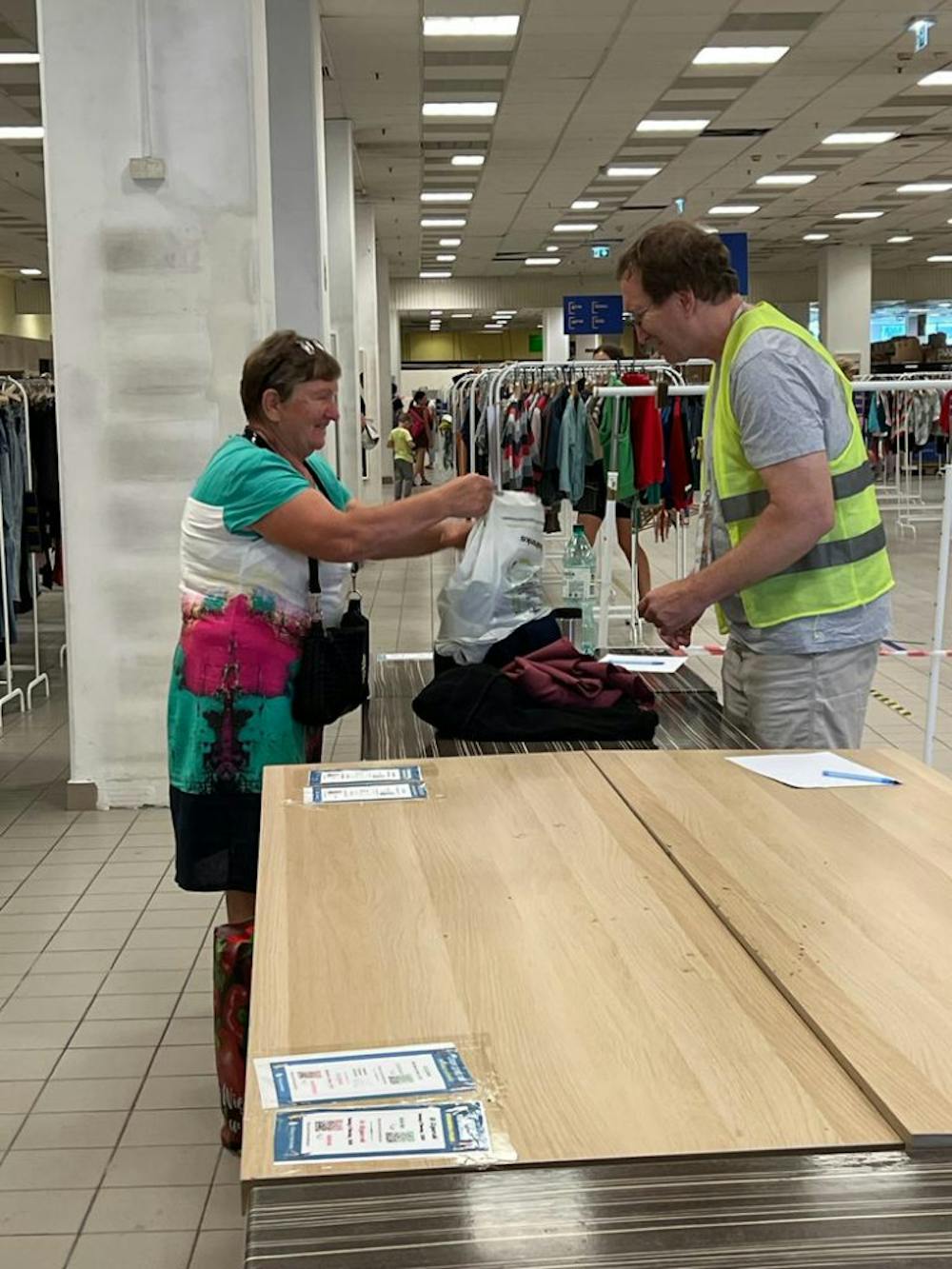
Ned Jacobson helps Ukrainian refugees obtain necessary items at the Szafa Dobra warehouse store in Krakow, Poland.
Although this was a Jewish Federation trip, most refugees are not Jewish. In fact, the CEO of the Krakow JCC told us that 90% of the Ukrainian Refugees who use the services of the JCC are not Jewish. He said this does not dissuade him and should not dissuade us from this very Jewish mission of repairing the world one person at a time.
The news cycle in the United States is shifting away from the war in Ukraine, but we cannot shift our focus away from the needs of these refugees Jewish or not. We as Jews present a very Jewish example of not abandoning "the other," when humankind has so often turned its back on the "other.” I have asked myself many times on this short and most powerful trip, where was the United States and the world 80 years ago when the Jews of Ukraine and Poland needed the worlds help. We must not repeat the mistakes of our past.
"Reflections on Mission to Poland" by Denise Alper
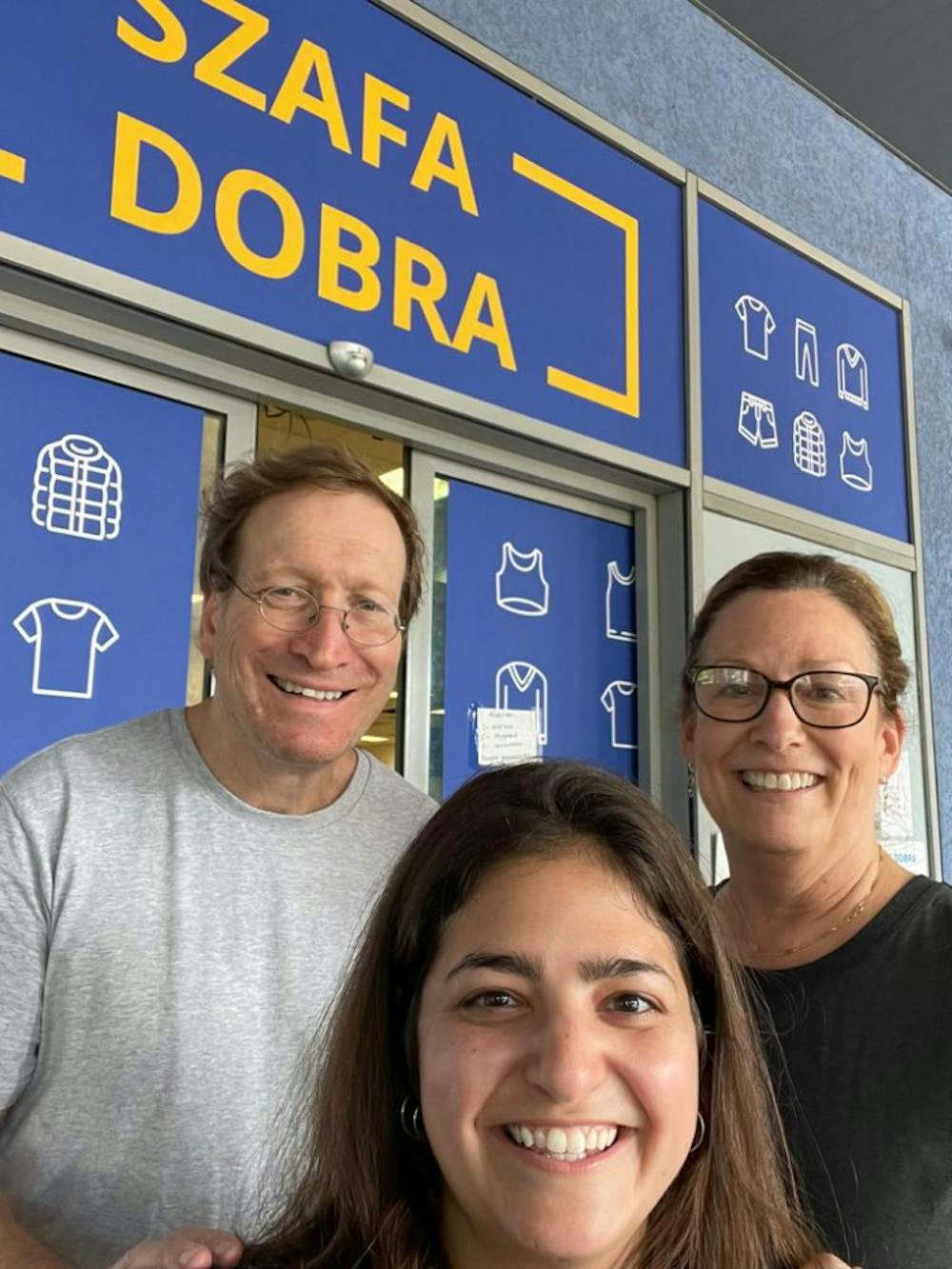
Denise Alper, pictured right, volunteered at the Szafa Dobra warehouse for refugees, along with Hayley Levy, center, and Ned Jacobson, left.
Poland has never been on my list of places that I’ve wanted to visit. My reductionist take on Poland was how anti-Semitic the country was before, during and after WWII. The black and white images of the Holocaust have been far too embedded in my psyche to necessitate a desire to see more.
But now Poland has shown the world a remarkable display of compassion and humanity for the millions of people who have flooded their country as a result of Russia’s full-scale invasion of Ukraine.
What I had not known, and was fortunate to witness, is the central role the JCC in Krakow is playing in this humanitarian rescue. The JCC opened in 2008 with financing from then ‘Prince’ Charles to help rebirth and rebuild Jewish life in the city. However, in February when the war began, the JCC transformed itself, with no prior experience, into a crisis center to assist refugees with essential food, housing and other necessities. This heroic effort is for ANY refugee, Jew and non-Jew alike.
Auschwitz is just an hour away and as we know all too well, a symbol of what can happen when the world does nothing. Fast forward to today, a Jewish organization is in the forefront dedicated to meeting the needs of a displaced people; most of whom happen not to be Jewish. This fills me with enormous pride and belief in the power of decency.
Our time in Poland was short, but I felt our efforts and presence were very much appreciated. Our “heroic contribution” at the JCC was to break larger boxes of sugar, coffee, tea and such, into smaller packets so that it can be stretched and distributed to the mostly mothers and children waiting patiently in line outside the building.
On our last day we visited families in temporary housing which is being leased by the JCC. We created art with the kids and interacted well despite the language barrier. When it was time to leave, we gave each child a small stuffed animal. A beautiful girl, probably age six or seven, went to find someone who could translate for her. With one hand holding on to the translator and in the other, the stuffed animal, she walked over to us and said, “You made my dream come true. Thank you so much for giving me this toy; I had to leave all my things at home.” Our tears in response required no translation.
"Leaving it All Behind" By Carol and Larry Hyatt
One of the memories that stands out most for us from our trip to Poland is the little girl, about the same age as our granddaughter, who was so grateful for the little stuffed animal we gave her that she insisted someone translate for her. She told us, “You made my dreams come true, since I had to leave all my toys behind.” And we couldn’t help but contrast her situation with that of our granddaughter who has a playroom full of toys at her house as well as at ours.
We were told that many of those who left Ukraine by train had agonized over what to take with them, not knowing what they would find if they are ever able to return. Then, once they arrived at the station, they had to leave even that behind so that more people could fit on the train.
Imagine making those difficult choices, leaving your home and possessions, and setting out on a dangerous journey to face an uncertain future when so recently you were just going about your life with only everyday concerns.We were so impressed with the work being done to help the many people who have fled their war-torn country. It made us proud of their efforts and of the generosity and caring of the Jewish people.
The Jewish Observer is published by The Jewish Federation of Greater Nashville and made possible by funds raised in the Jewish Federation Annual Campaign. Become a supporter today.
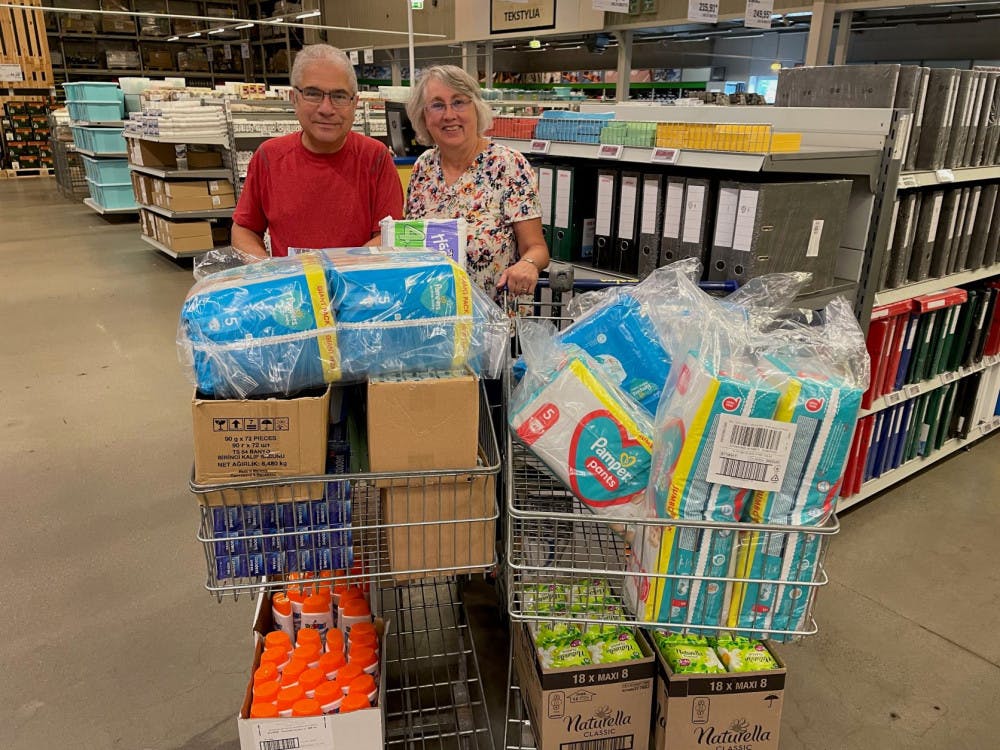
Carol and Larry Hyatt purchase much needed supplies at the Makro Big Box store in Krakow, Poland.
"The World Moves on, But The War Continues" by Hayley Levy Kupin
My first time in Poland was in 2013 for March of the Living, an educational program that brings students from around the world to Poland to walk in the history of the Holocaust. For me, it was a deeply personal trip as my ancestors on both sides are from Poland. My maternal grandfather, William Evers, who was one of the only members of his family to survive the Holocaust, was born and grew up in Poland. While March of the Living was about my roots, my most recent trip to Poland was as part of a 5-day mission delegation with the Jewish Federation and Jewish Foundation of Nashville and Middle Tennessee.
The goal of this trip was to volunteer with Ukrainian refugees and see firsthand how the war’s refugee crisis was being handled in Poland. When asked if I was available to go on this mission trip, I immediately said yes! I was honored to travel with seven of my closest, new travel companions.
Our first stop after landing in Warsaw was to visit the Jewish Agency for Israel (JAFI), which was set up in a hotel complex not far from the airport. When the war in Ukraine first started, JAFI had four hotels that served as temporary housing for Ukrainians looking to make aliyah to Israel. Now they operate out of just one hotel, as the refugee surge has slowed. More than 12,000 Jewish Ukrainians have emigrated to Israel since Russia invaded Ukraine, and more than 7,000 of those individuals have come through JAFI’s Warsaw office. We learned that Ukrainian refugees were referred to as ‘beneficiaries,’ not ‘refugees,’ to provide the families and individuals with dignity during this difficult time.
Our guide at JAFI, Kseniya, wanted to know from our group what Americans were saying about the war in Ukraine. At the time, American news had moved on from coverage of the war to midterm elections, flooding in Mississippi, and other issues nationally. The war that was once front-page news when it started was not the main headline in America anymore. It was heartbreaking to share with Kseniya and her coworkers that, for the most part, America’s attention had shifted.
Many of the aid coordinators that we met, like Kseniya, were Ukrainian themselves. Kseniya got stranded in Warsaw while on vacation when the war first started. She was separated from her family and has not been home since the end of February. She has only the suitcase of belongings from her vacation, probably like the suitcase I was traveling with for just one week.
Kseniya introduced our group to two beneficiary families hoping to make aliyah and translated their stories for us. One family was from Kharkiv, which had been taken over by Russia and only recently regained by Ukraine. The parents shared their struggle to get to Poland and why they
wanted to take their little girl to Israel. We also heard from an elderly couple, who was forced to hide in their basement without electricity, food, or water. When they left their home, the woman shared that they came across dead bodies in the street as they sought to leave the city.
Our group asked these families what they wanted us to tell our families and friends back in America. The elderly beneficiary broke down crying as she told us that she wants people to know what they have been through. That their lives used to be normal, like ours, until one day everything changed. She told us the death tolls are much higher than what is being reported. She hopes for peace and for Ukraine to win the war.
At the end of our time together, both beneficiary families thanked us for being there, for donating our time and money, and for paying our taxes, through which America has supported Ukraine. I had never been so happy about paying taxes.
Even after talking with Ukrainians who fled their homes, I could still not imagine having to flee my home during a war. What would I bring with me if I could only take what I could carry? How would I keep my family safe? Where would we go? What would happen if I was separated from my husband? What would we do if we had children to protect, like so many of the families I saw? All questions that are impossible to answer.
Another aid coordinator we met was a Polish man named Roger. When the Russian-Ukrainian War broke out, and beneficiaries started flooding into Poland, he felt compelled to give up his job to work with an NGO (non-governmental organization) offering aid. Since March, he had been volunteering with the Internationaler Bund Polska Foundation. This Foundation operated a warehouse called Szafa Dobra, where beneficiaries can “shop” for clothes and other necessities, all for free. Szafa Dobra was set up in an empty shopping plaza that was about to be demolished.
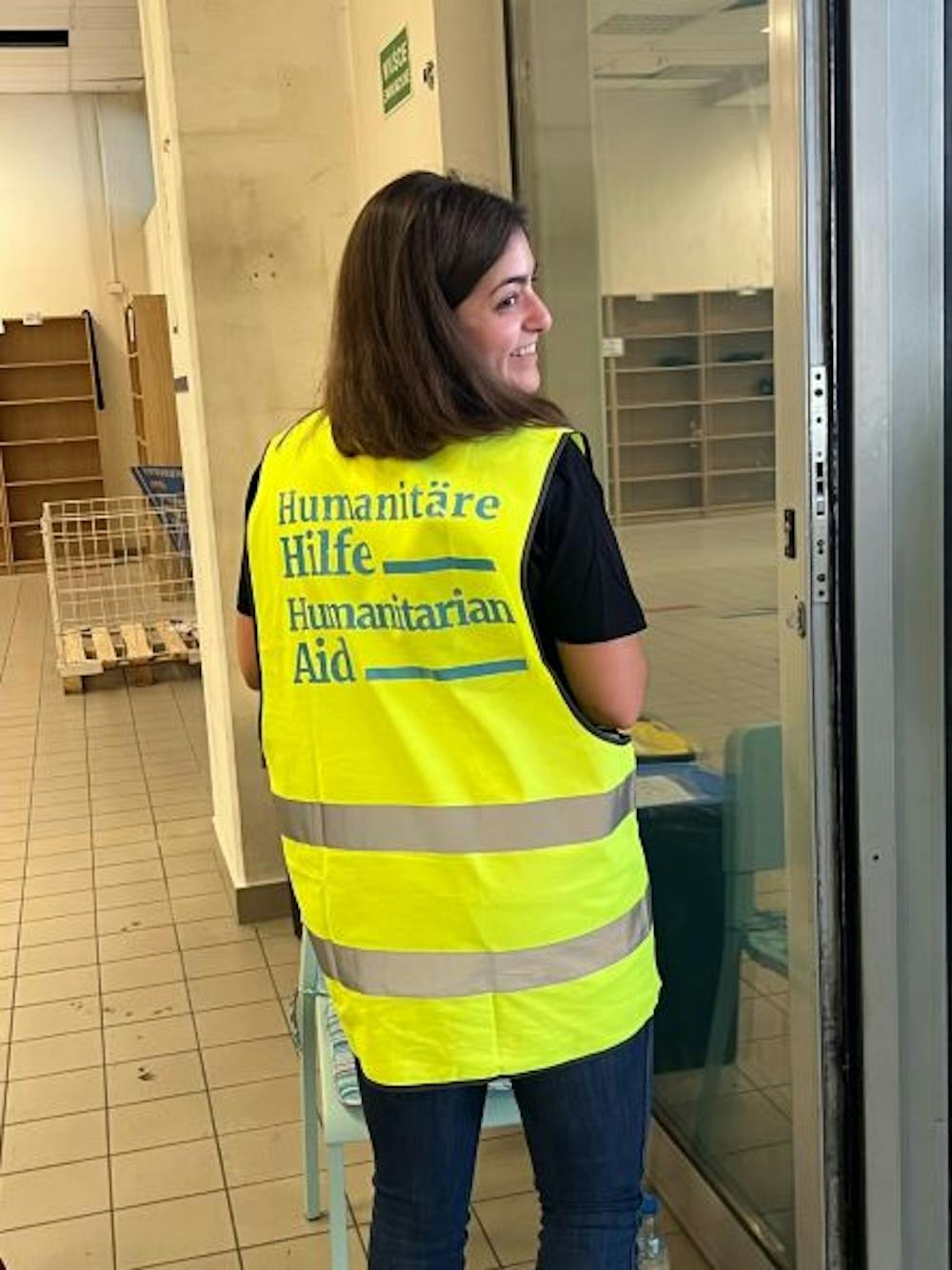
Hayley Levy spent time volunteering at the Szafa Dobra refugee center.
On Shabbat, part of our group went to volunteer at Szafa Dobra. It was the last day the warehouse would be open. Soon, the building would be demolished, and Szafa Dobra needed to relocate. At the time we volunteered, they did not know where they would move or when they would be able to reopen.
That Saturday, my volunteer job was crowd control. I was tasked with counting each person who entered and left the Szafa Dobra warehouse on an app. The most popular item for beneficiary shoppers was underwear – it was heartbreaking to know that people had to flee their homes, leaving the most basic, everyday pieces of clothing behind. Since the day we were volunteering was the last day Szafa Dobra would be open, we were told to expect a higher turnout than normal. Typically, they served around 400-450 people a day. That day we served 554 beneficiaries – the highest number of beneficiaries served in one day. I counted!
I was amazed to see so many American volunteers everywhere we went. Besides our group, we met an American couple visiting family in Krakow and volunteering for a few days while vacationing. Then, I met a sociology graduate student, at school in California, spending her summer volunteering at Szafa Dobra while documenting stories of women impacted by the
war. There was a Florida retiree, originally from Poland, who spends half the year in Florida and the other half in Krakow, volunteering each Saturday he was in his home country. Another volunteer from Florida, John, helped show us the ropes at Szafa Dobra.
Unlike during the Holocaust, or even with other international crises, Poland is now doing its very best to support the Ukrainian beneficiaries. Not only have private organizations like the JCC of Krakow and NGOs like Szafa Dobra stepped up to offer aid, but the Polish government is offering direct aid. We did not see refugee camps or tent cities because Polish citizens are housing beneficiaries themselves. Our guide and driver shared that they have been hosting Ukrainians in their homes since the beginning of the war. In fact, the Polish government is providing full access to free health care and public education for Ukrainians, as well as work visas.
It is obvious the war is not ending as soon as everyone had thought or hoped. The beneficiary population may certainly continue to grow and those who are already displaced will continue to need aid. Some may ask if it was worthwhile to visit and volunteer for only a few days. In return, I would say definitely! Our Nashville Jewish community needs to do more than simply raise funds to donate, though that is also very much needed. We cannot forget what is happening in Ukraine, even if it is no longer the headline story here in the United States. As Jewish, Ukrainian President Volodymyr Zelensky said in a plea to the American Jewish Committee and the Jews of the world by video on June 12, 2022, “I ask you to redouble your efforts… so that we could end this war sooner.”
"Reflections" by Rabbi Flip Rice
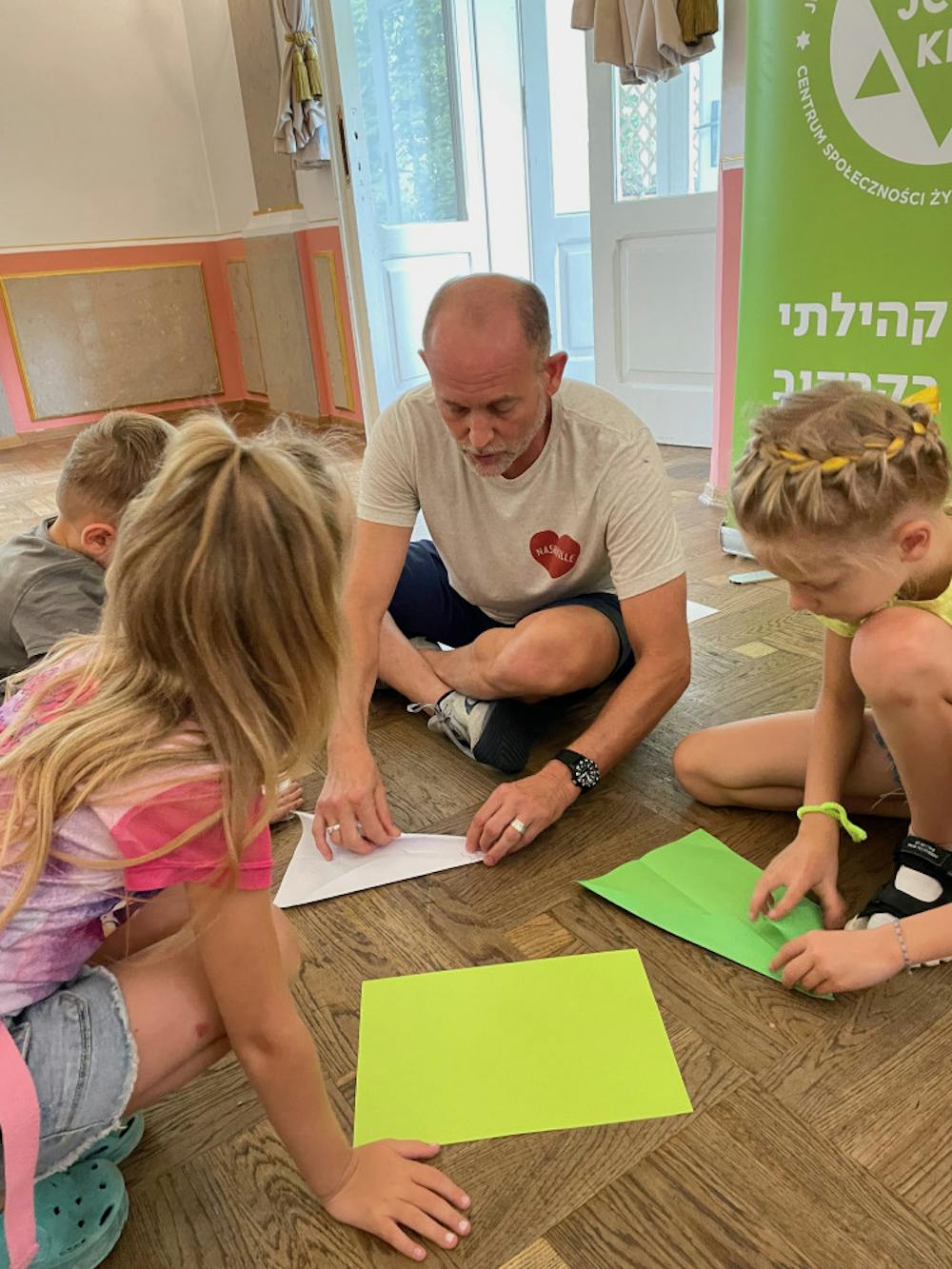
Rabbi Flip plays with children at the Pszkowaka Palace
They are called the beneficiaries. We quickly understood why. It is a more dignified term than refugee. It’s an appropriate name because by definition they receive assistance…property that originally belonged to someone else: donated clothes, peanuts, coffee and tea, toys, rice… These were some of the basic supplies that the Nashville Team of 7 prepared for giveaway at the JCC in Krakow, Poland.
The beneficiaries are, for the most part, not Jewish. Yet they stand in line in the Jewish quarter of a city anxious to receive the free supplies, in a country that saw its Jewish population decimated by the Nazis. The beneficiaries are, for the most part, largely traumatized by having to leave their homes, and many of them their husbands…and their first world lives in the Ukraine. These are not the type of immigrants we often see here in the states. Most are or were quite wealthy: who do you think gets out first? Yet their lives have been uprooted by war. Their children are confused and just want to play. Their stories are harrowing.
There is Diana. She is as unhappy as she looks. She is in a foreign country. She has not seen her father in some time. Her mother is driving her crazy. She does not speak English and yet I determined all of this based on her body language and my interactions with her. It took a while…but your rabbi got her to smile. I taught her how to play dots…a simple game I used to play with my children on a napkin when they were young and the food at the restaurant was taking too long. My children needed to be entertained, comforted, and coddled If and when the food we ordered took an extra 10 minutes. Diana has required comforting for months now…By a strong and hurting mother, by contemporaries – other kids, and by professional therapists. She made me something out of paper. It melted my heart. Her mother and I are now Facebook friends, even though we don’t speak the same language.
Diana is one of several children at the Paszkowaka Palace located outside of the city of Krakow.

Rabbi Flip Rice and Diana spend time together in Paszkowaka Palace, a home for Ukrainian beneficiaries.
The Palace has been transformed into a home for several of the beneficiaries. It was supposed to closed in July. Then the plan was to close it by September. They are currently planning on being open beyond the first of the year. Here again the beneficiaries (Diana included) are not Jewish. It is important to mention because part of what drives the employees of the Krakow JCC
is history. When they came for the Jews of Poland in 1939 no one did anything. So, it was not an option to do nothing for others in 2022. THEY CANNOT DO EVERYTHING, BUT THEY COULD NOT DO NOTHING! The Jewish community of Poland felt compelled to do SOMETHING to help BENEFIT the now 2 million+ people who have made their way from the Ukraine to Poland.
What about the Jewish ones? To answer that question, I must back up. We flew first to Warsaw. Our team included Micah Members Larry & Carol Hyatt, West End Members Ned Jacobson and Federation staff member and Observer Editor, Barbara Dab. Temple Members
Denise Alper & Haley Levy. Our mission included spending time there witnessing what the Jewish Agency is doing.
I know we value humility here at Micah, but almost nothing made me prouder to be a Jew.
Our first stop was a hotel, not our hotel. At first, we were confused when we arrived. There were several individuals with earpieces…The kind you see on folks who work security. The hotel is serving as a temporary housing unit for the thousands of beneficiaries who are in the process of making Aliyah…moving to Israel.
Here we heard actual…WAR…stories. People who fought tears (and some who did not) describing how they fled Mariupol by car, Kiev by train…escaping death. Leaving behind their lives. There are many who do not ever plan to return to the Ukraine. As opposed to what happened during the Shoah – the Holocaust, we - the Jewish community- now has a powerful, worldwide network. A way to get our people out…and to safety. If it had only existed, then.
A woman explained her personal journey to Poland from the Ukraine and how she came to work for the Jewish Agency. During our time at this temporary housing center, we also met with a man who oversees immigration for ALL OF ISRAEL. You want to talk power. Sitting in this makeshift office of a hotel in Warsaw he decides the fate of thousands of people. He could have been a member of Micah…and here is why: He wants to help people…ALL people. His job requires that those wishing to immigrate to Israel, provide any shred of evidence that they have Jewish blood: even a distant grandparent. You don’t have to be empathic to sense the fear in an interview room.
Our goal was to get to Krakow, but we spent some time in the Jewish museum and bore witness to the Warsaw Ghetto Uprising, visiting this wall it was hard not to imagine what had happened behind it. The pain, strength, resilience of those who walked the very same earth before us. Unbeknownst to my fellow travelers, I had arranged a meeting with Marta Kubica.
Marta works for ELNET – The European Leadership Network – an organization that makes connections between European governments and the State of Israel. Conceived of and chaired by Micah Member Larry Hochberg – who happens to also be my father-in-law, ELNET works in 10 countries. Marta was able to answer several questions, not just about the refugee crisis, but about the politics of Poland. It is as difficult to get an abortion there, as it is now, here. CBD, however, is legal, and available for distribution in kiosks.
We awoke the next morning and took the train to Krakow. A strange feeling encompassed me as a boarded a train in Poland. Most, if not all the buildings in Warsaw are new, because the Nazis leveled the place. Krakow, however, was preserved, as it served the Germans’ purpose.
The Krakow Jewish Community Center could probably fit in this room. Packed with employees, volunteers, and beneficiaries, the place is tired and yet beautiful; vibrant and yet sad. We spent a few hours packing supplies along with a few Americans and Israelis just traveling through,
and gave them the Nashville Federation $17,000 donation. The work that we did for just a few hours on just a few days, has been ongoing for months. By chance, we spoke with the director -
Jonathan Orenstein. He had been away and was just back from the states speaking to Jewish communities, raising awareness and money. Helping beneficiaries is not part of the Krakow JCC mission statement, But IT IS part of a Jew’s mission on earth. A New Yorker by birth with Israeli citizenship, Jonathan was actually quite critical of the work of the Jewish Agency. “Don’t you think that if those people really wanted to make Aliyah to Israel, they would have before the war?” Jonathan said. Revealing the layers of complexity around the matzav – the situation.
On the Sabbath a few of us made the sacred pilgrimage to Auschwitz and Birkenau. Our tour guide – a young woman, had grown up in the city of Auschwitz, probably not far from the McDonald’s. And she told us that she felt compelled to do the work she does, because of it.
With a sincere and gentle knowledge, this non-Jewish woman guided us through the barracks and into the gas chambers. Theological thoughts raced through my mind. Words written by scholars I have studied for decades now.
Eliezer Berkowitz:
“Just keep your Christian hands off our Jewish babies.”
Or Richard Rubenstein:
“Why did God save us in Egypt but not in Europe?”
Emile Fackenheim:
“We now have a 614th commandment, we must not grant Hitler
a posthumous victory.”
I comforted myself with the words of Roger Gottlieb:
“I do no real justice to the six million,
if I do not delight in the singing of Jewish songs by children.”
I thought of Cantor Goldberg, Rabbi Laurie, and our Education Director Julie Greenberg and how they would be leading such songs at Micah only hours later on the first day of J-Lab – our religious school.
Concentrate. Isolate. Exterminate. That was the Nazi’s plan. And it worked. So now THE Jewish community is concentrating. It’s concentrating its efforts on how best to help, even if we disagree on what the best course of action might be. It is taking the vulnerable, like Diana and her mother and isolating them from the pain. And it is exterminating. Eliminating the danger and addressing the grief.
We may not be able to do everything, but we refused to do nothing. So, I did what I could.
I sat on that floor of an ancient castle, only kilometers away from death camps, wondering
why my government didn’t drop a bomb on those train tracks as I showed a small group of children how to make paper airplanes. Because they are just children, and they deserve to have a childhood. Something that was denied our predecessors in the camps. Truth be told, I am a beneficiary. Not because my “father was wandering Aramean who fled Egypt.”
I am not a refugee. Rather I was blessed to BENEFIT from spending a few days, in a difficult and beautiful place, with Jewish and non-Jewish volunteers, with people who are struggling, vulnerable, and with Diana.

